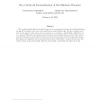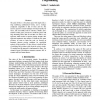140 search results - page 2 / 28 » A relation-algebraic approach to simple games |
ICALP
2009
Springer
14 years 8 months ago
2009
Springer
We consider graphical games in which edges are zero-sum games between the endpoints/players; the payoff of a player is the sum of the payoffs from each incident edge. We give a si...
CEC
2010
IEEE
13 years 8 months ago
2010
IEEE
In modern racing games programming non-player characters with believable and sophisticated behaviors is getting increasingly challenging. Recently, several works in the literature ...
DIGRA
2005
Springer
14 years 1 months ago
2005
Springer
With pervasive gaming, novel types of games have recently emerged. The idea is to apply pervasive computing technology - which embeds computers in real-world, everyday environment...
DIGRA
2005
Springer
14 years 1 months ago
2005
Springer
Videogames have been studied seriously only for a few years. So, we can wonder how we could use the recent academic works to approach new design methods. This article proposes a f...
AAAI
2000
13 years 9 months ago
2000
The game of Hex is a two-player game with simple rules, a deep underlying mathematical beauty, and a strategic complexity comparable to that of Chess and Go. The massive game-tree...


